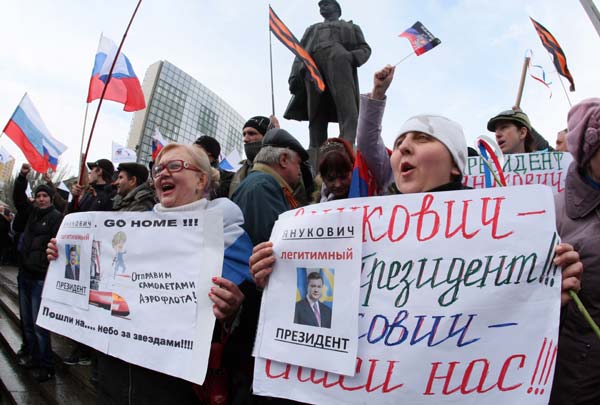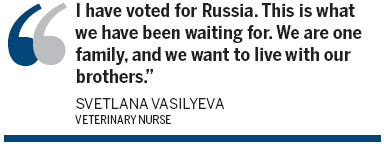 |
|
Pro-Russian activists hold posters reading "Yanukovych is our legitimate president" and "Yanukovych saves us" during their rally in the eastern Ukrainian city of Donetsk on Sunday. Alexander Khudoteply / Agence France-Presse |
Crimean majority set to celebrate as minorities, West dispute process
Crimeans took to the polls on Sunday for a referendum on breaking away from Ukraine and joining Russia, part of a Cold War-style security crisis on Europe's eastern frontier that began with the toppling of Ukraine's central government at the end of February.
The ballot gave voters the choice between becoming become part of Russia or staying in the Ukraine but with more autonomy. Maintaining the status quo was not an option on the ballot sheet.
Cossacks and self-defense militias were seen patrolling some polling stations in Crimea's regional capital Simferopol on Sunday and Russian flags were being flown everywhere.
Ukraine's new government and most of the international community except Russia have said they will not recognize the result of the poll, which is expected to be overwhelmingly in favor of immediate secession.
"This is a historic moment; everyone will live happily," Sergiy Aksyonov, the local pro-Moscow prime minister, told reporters after casting his ballot.
"We will celebrate this evening," Aksyonov said, after a man waving a blue-and-yellow Ukrainian flag and demanding it be put up inside the polling station was pushed away by security guards.
The Black Sea peninsula is inhabited mostly by ethnic Russians and has been seized by Russian forces over the past month after Ukraine's uprising, plunging US-Russia ties to their lowest point since the fall of the Berlin Wall in 1989.
Ukraine's interim president Oleksandr Turchynov, who last month replaced ousted Kremlin-backed Viktor Yanukovych, called for a boycott of the ballot, accusing Moscow of preparing an invasion plan.
"The result has been preplanned by the Kremlin as a formal justification to send in its troops and start a war that will destroy people's lives and the economic prospects for Crimea," he said.
Some Crimeans who requested anonymity said they were planning to spoil their ballots in protest and there was a call on social media for people to stay at home and cook vareniki - Ukrainian dumplings - instead of going out to vote.
In Simferopol, dozens of people lined up outside to cast their ballots early.
"I have voted for Russia," said Svetlana Vasilyeva, a 27-year-old veterinary nurse.
"This is what we have been waiting for. We are one family, and we want to live with our brothers.
"We want to leave Ukraine because Ukrainians told us that we are people of a lower kind. How can you stay in such a country?"
The majority of Crimea's 1.5 million people, like Svetlana, support leaving Ukraine and becoming part of Russia, citing expectations of better pay and the prospect of joining a country capable of asserting itself on the world stage.
But others see the referendum as nothing more than a geopolitical land grab by the Kremlin, which is seeking to exploit Ukraine's relative economic and military weakness as it moves toward the European mainstream away from Russia.
Ethnic Tatars, Sunni Muslims of Turkic origin who make up 12 percent of Crimea's population, said they would boycott the referendum, despite promises by the authorities to give them financial aid and proper land rights.
Preparations to become part of Russia - a process that could take months - are to begin this week if the referendum result is pro-Moscow.
Pro-Russia authorities and Moscow say the referendum is an example of self-determination like Kosovo's decision to leave Serbia, but Washington says it cannot be democratic because it is taking place "under the barrel of a gun".
Tensions have escalated in mostly Russian-speaking parts of eastern Ukraine ahead of the referendum.
Three activists have been killed in the eastern cities of Donetsk and Kharkiv in the run-up and pro-Moscow supporters have called for similar separatist polls in other Ukrainian regions.
AFP-Reuters
